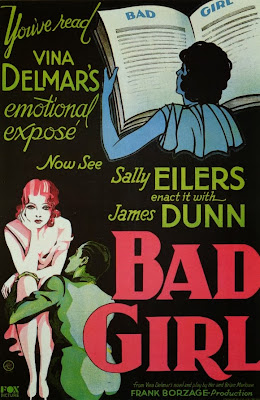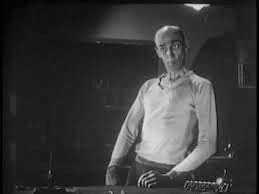That miscommunication is the entire premise behind Bad Girl, right down to the title. One of this blog's rare Oscar-winners (for direction and writing) Bad Girl promised the usual sexy pre-code elements: risque chatter, cigarettes, bathtub gin, a token gay character, violence and, if I was lucky, a reference to reefer or happy dust. It was a promise broken.
 | |
| DOT: "I love when you call me insulting names." EDDIE: "Thanks, jerkwad." |
 |
| I've only got eyes for that cool radio in the rear. |
 |
| Dot obviously doesn't remember that boxers in old movies always wear a bandage over their eyebrow. |
I was to be sadly disappointed. These two crazy kids are in love -- but not enough to have a simple, honest conversation. Dot's pregnant, but can't tell him. He thinks she wants to move out of their one-room flat, so he blows his savings -- which he was going to use to open his own radio repair shop -- on a fancy apartment for them. She thinks he doesn't want a child, so she pretends to feel likewise, leading him to pretend likewise. To pay for the doctor, Eddie takes up boxing for extra money, but doesn't want to tell Dot, so she thinks he's out carousing with the boys. Then when the kid is finally born, Eddie pretends not to care because he thinks Dot doesn't care, so she gets depressed...
Get the picture? Like, there would be
no picture if, just once, Dot and Eddie just took five minutes to ask
each other, "What's going on?" instead of acting on wildly specious speculation? By the time they come to their senses (after wrongly believing their baby had died), I was hoping, Well, maybe now their new found happiness will be disrupted by
real tragedy. Like, say, when riding home in a cab from the hospital they'd get into an accident and the kid really bites the dust. And their marriage falls apart and Dot finally becomes
that titular bad girl by going the streetwalker route, leading to her
to die of consumption in Eddie's arms when he finds her coughing up
blood in a back alley on the West Side. Now we've got a movie!
 |
| Wipe those smiles off your faces! |
That's not the way things work out, though. What Dot and Eddie experience instead is a realization of their true feelings for each other, followed by a kiss, a fadeout, and two or three minutes of the restored post-credit exit music under a black screen. Oh man. What a washout of a movie.
 |
| Frank and Oscar |
Well, no, not really. Thanks to Frank Borzage's sympathetic direction and Edwin J. Burke's snappy dialogue, Bad Girl rises to a level that a similar movie could never achieve. Borzage, at the time one of Fox Studio's great directors and an expert at romantic dramas, makes you care about Dot and Eddie despite the absurdity of their situation. They're not stupid, just victims of their own battered personalities: Dot, by not knowing how to trust men, and Eddie, by knowing nothing but unhappy couples and families. A fine scene during their first date shows them in Dot's tenement hallway, interrupted by a middle-aged couple arguing off-screen and, a moment later, an older woman facing a death in the family. Borzage allows each of these mini-dramas play out in single takes, never laying on the action too thick, allowing Eddie to remember why he's preferred to live a solitary life -- even if deep down he would rather be with a good woman.
Dot, too, has always been single, spurning men's advances with icy putdowns. As she tells her friend Edna, "When they deliver baloney to my door, I always give them a receipt." Yet upon meeting Eddie -- and voicing her complaints about amorous men -- he dishes it out in a nastily amusing comeback:
 |
| You tell her, Eddie! |
That's better than Hamlet's soliloquy. I mean, don't you wish you talked that way?
 |
| "Let's put up a sliding board into the East River while we're at it!" |
Little unspoken touches elevate Bad Girl from the silly melodrama it could have been. Eddie's radio is old even in 1931, visual proof that he's saving his money. The sink in Dot and Eddie's first apartment is in the living room. The rooftop of Dot and Eddie's new apartment features a realistic view of the Queensboro Bridge. Dot, by the way, believes the roof would be a wonderful place for children to play. Upper East Side mothers today would self-righteously disagree.
Might a different cast made a difference in Bad Girl? It's difficult to say. While quite the looker, Sally Eilers' personality pales beside, say, that of Bette Davis, who was getting her start in Hollywood about the same time. James Dunn lacks the depth of, say, James Cagney or Lee Tracy, either of whom could have done more with the same
character, if not the script itself.
Only Minna Gombel, who could best be described as a proto-Eve Arden, commands a level of realism as Dot's blunt pal Edna, upping Eilers' game in their scenes together. One of Bad Girl's best moments consists of the two reminiscing about the unreliable men they've known, leading to a laughing/crying jag that would probably strike a note of uncomfortable realism for more than a few women today. (Unless I wasn't paying attention, Edna's relationship with the little boy she lives with was never explained. Is he her brother? Illegitimate son? The director's nephew?)
And yet... the sheer likeability of Sally Eilers and James Dunn cannot be denied. Yes, their characters' self-defeating behavior is often annoying, at times disturbing. But they're not bad people, just a couple of souls so battered by life that, even when they fall in love, withdrawal is the only way they can deal with one other. As with the title Bad Girl itself, Dot and Eddie are selling themselves one way while disguising the reality that lies beneath. You know, the way humans often do.
But damn, I sure wanted to see that bad girl I was promised.
************************
If you've never heard of the above-mentioned Lee Tracy, you might want to read about two of his more interesting movies by clicking here and here.
 |
| Take it from them: men are no damn good. |
Only Minna Gombel, who could best be described as a proto-Eve Arden, commands a level of realism as Dot's blunt pal Edna, upping Eilers' game in their scenes together. One of Bad Girl's best moments consists of the two reminiscing about the unreliable men they've known, leading to a laughing/crying jag that would probably strike a note of uncomfortable realism for more than a few women today. (Unless I wasn't paying attention, Edna's relationship with the little boy she lives with was never explained. Is he her brother? Illegitimate son? The director's nephew?)
And yet... the sheer likeability of Sally Eilers and James Dunn cannot be denied. Yes, their characters' self-defeating behavior is often annoying, at times disturbing. But they're not bad people, just a couple of souls so battered by life that, even when they fall in love, withdrawal is the only way they can deal with one other. As with the title Bad Girl itself, Dot and Eddie are selling themselves one way while disguising the reality that lies beneath. You know, the way humans often do.
But damn, I sure wanted to see that bad girl I was promised.
************************
If you've never heard of the above-mentioned Lee Tracy, you might want to read about two of his more interesting movies by clicking here and here.



































